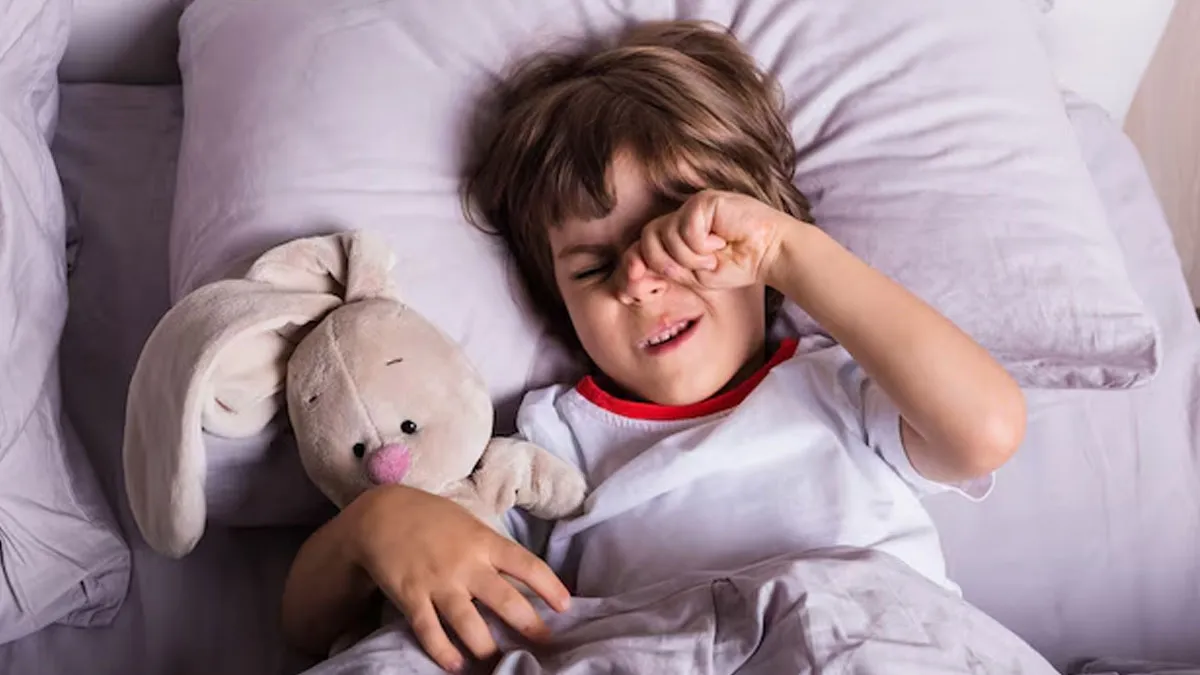
Sleep talking is a phenomenon where people tend to talk in their sleep. If your child sleeptalks, they might sound like they are awake, but they are talking or reliving past events. Or something from a future that is bothering them. Apart from these, there may be many reasons behind it, and it doesn’t always need to be a worrying one.
Table of Content:-
In the conversation with Only My Health, Dr Sameer Malhotra, Senior Director and Head of Mental Health and Behavioural Sciences, Max Super Speciality Hospital, Saket, said, “Sleep talking in children is common and usually normal. It often occurs during light sleep phases and tends to decrease as they grow older without any lasting effects. It is seen in both REM (Rapid Eye Movement) and NREM (Non-Rapid Eye Movement) stages of sleep.”
What are the Reasons for Sleep Talking in Children
Though sleep talking is quite common, there are several factors why your child might be sleep talking. Dr Sameer Malhotra pointed out some of the reasons for sleep talking in children.
Stress and Anxiety: Children also go through stress, like adults. The reasons for their stress might be different from adults, such as school pressures, peer and social pressure, changes in the family or even some occurrences. Their mind remain overactive, and hence, that may be the reason they sleep talk. This might be their way of channelling their emotions.
Fever: Fever can also be a reason for sleep talking. During a fever, a person’s body is tired, which sometimes leads to nightmares and sleep talking.
Sleep Deprivation: Children’s bodies are in their developmental stage, and hence, sleep is crucial for their growth. Therefore, sleep deprivation can cause sleep talking. Late bedtimes, irregular sleep routines, and other factors contributing to sleep deprivation can lead to sleep talking.
Genetics: Genetics also play a role in sleep talking in children. If they have a family history of sleep talking, it is possible that the children inherited it from their parents or any biologically related family members.
Also Read: Neurologist Explains 5 Ways In Which Sleep Benefits Your Brain
Is Sleep Talking in Your Children Something You Should Be Worried About
Dr Malhotra stated that generally, sleep talking is not something you should worry about. This can be just a phase for some children. However, as parents, you need to be more mindful when these sleep talks become frequent, or if they get louder, disruptive, or worsen with frequent nightmares, or even sleepwalking, for that matter.
Then, Dr Malhotra suggests that it is important to get in touch with professionals and seek psychiatric advice if needed. You can get a sleep study done for your child. He advised parents to be active in their children's lives if they are facing any kind of bullying or abuse. This will help parents reach out for the right help at the right time for their children.
What are the Precautions One Needs to Take
“Precautions are always better than a cure” - we all have heard it, and hence, as parents, it is important to know what you can do for your child’s undisturbed sleep.
“Encourage Good Sleep Hygiene” is what you need. And here are some expert-verified steps on how to do that:
The Sleeping Environment
Parents should practice good sleep habits with their children from early on. The sleep environment is very important to make your child feel relaxed and calm. Ensure that your child's bedroom or any room that he/she is sleeping in is quiet and comfortable for sleeping. Ensure the room temperature is suitable for your child's peaceful sleep.
Bedtime Routine
Have a bedtime routine in your family that you follow every night. This will help your child follow the cycle, and their body will get enough sleep. The bedtime routine is beneficial for sleep, family bonding and the development of your child. Include using the washroom before bedtime so that your child's sleep is not disturbed.
Improve Your Child’s Sleep Pattern
Your child's sleep is very important for their healthy growth, and as parents, you need to take it very seriously. Parents need to make sure that they don’t cause any kind of arguments during bedtime because that can affect their child and cause stress for them. This stress will further hinder a child’s sleep cycle, causing them to sleep talk or even have nightmares. Avoid engaging in any drinks, such as caffeine, before bedtime it also hinders your child's sleep cycle.
National Library of Medicine conducted a study on “Benefits of a bedtime routine in young children: Sleep, development and beyond. The study found that bedtime routines have positive outcomes for children, especially at-risk ones. The bedtime routine improves sleep, the child's emotional and behavioural regulation. Apart from improved sleep cycles, the bedtime routine also supports broad development and well-being in early childhood.
Takeaway
Sleeptalking in children is generally a harmless and temporary phase of childhood development. It typically does not indicate any serious medical or psychological condition. Most of the children outgrow the sleep-talking phase as they mature. However, for some children, sleep talking can be frequent, intense or even accompanied by nightmares. This is when you need to consult the expert and practice good sleep hygiene for your child. These early steps will ensure that your child does not face severe sleep problems in the future.
Also watch this video
How we keep this article up to date:
We work with experts and keep a close eye on the latest in health and wellness. Whenever there is a new research or helpful information, we update our articles with accurate and useful advice.
Current Version
